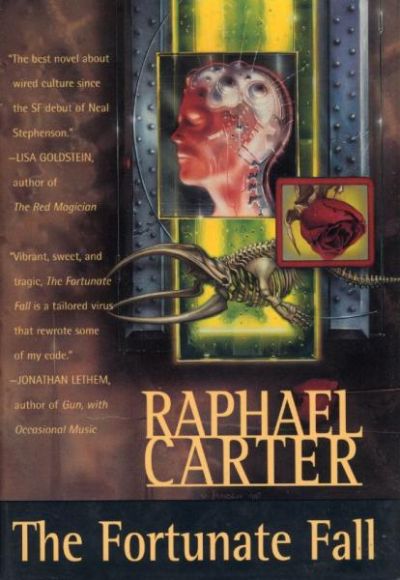We’ll live together, like two neighbour vines, Circling our souls and loves in one another
The Fortunate Fall
By Cameron Reed

16 Feb, 2016
0 comments
Added in 2023: The Fortunate Fall was published under a now disused byline. The author embraces the name Cameron Reed and to reflect this, I have amended the review appropriately.
1996’s The Fortunate Fall was Cameron Reed’s debut novel — and to date, their only one. While we can regret not having more Reed novels, we can also be grateful that we have at least this one … which is a fine book.
The genocidal Guardians fell to the Unanimous Army, a vast horde of mind-controlled slaves dancing on the strings of neurological implants. Once the Army’s task was completed, the surviving soldiers were freed to survive as best they could, often thousands of miles from home. Chaos followed.
Two law enforcement bodies, the Weavers and the Postcops, are determined to take whatever steps are necessary to prevent anyone from duplicating the crimes against humanity devised by the creator of the Unanimous Army (crimes that include the dark art of mind sculpting). Woe to anyone who falls afoul of either police force.
All this is history. For Maya Andreyeva, it is half-remembered history at best. She is an Eye (what passes for a journalist in the novel’s imagined future). Her nervous system is connected to the net, so that millions of people can experience what she experiences, see what she sees. Of course, her output is carefully edited; her superiors have no desire to see their carefully orchestrated regime endangered by rogue info.
That’s OK by Maya. It is quite unwittingly that she gives the world an experience it will never forget.
Many of the 24th century’s wonders have their roots in atrocity: why bother with cruel experiments on innocent animals when one has vast prison camps filled with entirely disposable people? Enemies of the states are doomed to miserable ends … so why not ensure those painful deaths serve the greater good? The Guardians are long gone, but people around the world still enjoy the benefits of the Guardians’ crimes against humanity.
Pavel Voskresenye survived the Guardians. He survived ill-conceived rebellion, the inevitable arrest, even the suicide attempt that left him nearly mindless. The shell of Pavel that was left seemed perfect material for Aleksandr Derzhaven’s research; Pavel survived that as well. Transformed by his experiences, Pavel has managed to prosper, even as his allies in the post-Guardian world have fallen one by one to the Weavers and the Postcops. Now Pavel would like to explain to Maya (and, through her, the world) how he survived.
It’s ancient history; it involves more politics than Maya finds comfortable. She soon becomes even more uncomfortable when she discovers that, in this case, the political is all too personal .
~oOo~
This would have made an even better Valentine’s Day review than Triton. Oh, well.
This book is late cyberpunk … hence I did not expect to like it all that much. By 1996, American cyberpunk seemed to be pretty much dead, reduced to its most easily emulated surface features. Too much of American cyberpunk was egregiously bro-tastic; women figured mainly as set decoration and rewards for the protagonists. I expected more of the same. I certainly didn’t expect this.
It is even better than “damn good for cyberpunk.” It is ambiguous, complex, demanding. Reed trusts readers enough to toss them into the deep end.
The whale, the traitor; the note she left me and the run-in with the Post police; and how I felt about her and what she turned out to be — all this you know.
Those opening lines are a lie; we the readers don’t know any of that and we don’t know all of it until the final page. We do eventually learn the history, the backstory for Maya’s present life, but all that’s only after Pavel comes on stage. Before that, we are exposed to Maya’s world in snippets, fragments, hints that are poorly explained. Of course nobody in the 24th century needs to have their own culture explained to them.
The novel’s backstory transitions from the comfortably abstract to the horribly personal very quickly. Maya lives in a world where technology allows grandiose, hubristic schemes to be realized. At least one of the architects is intimately connected to Maya in ways Maya could never imagine.
The final line of the book is as memorable as the first line … and more brutal. I won’t quote it lest I spoil the experience of reading The Fortunate Fall. I will say only that this last line is no way reminiscent of the last line of Hello Summer, Goodbye1; it doesn’t subvert all that went before; it takes events to their logical conclusion.
I would love to say “and of course you can buy The Fortunate Fall here.”” But you cannot. As far as I can tell, this had a hardcover edition in 1996 and a trade paperback in 1997 and then nothing. This probably indicates that the novel was not commercially successful. All I can say is that it would be worth your while to keep an eye out in used bookstores.
Jo Walton reviewed this a few years ago. I have been very careful not to look at her review while composing this, but if you would like to see what Jo thought, her review is here.
1: I was going to link to the same article I linked to last time I mentioned this novel but instead have a placeholder for a review to come.
